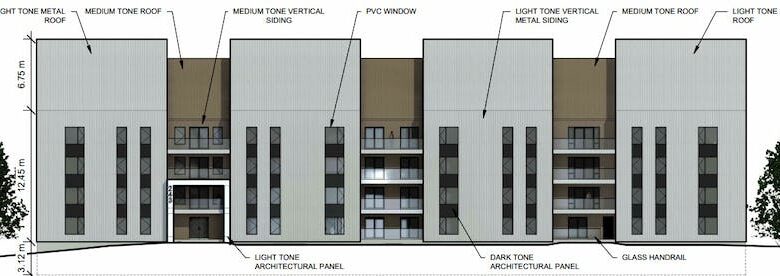Rejection of development in Beaver Bank overturned by N.S. UARB

BEAVER BANK, N.S. — An HRM community council is being ordered to approve a development agreement that it rejected.
The north west community council rejected a proposal for a 46-unit, four-storey building in Beaver Bank, but the developer appealed to the Nova Scotia Utility and Review Board. The board recently reversed the decision and ordered the community council to approve it.
On Tuesday, the community council is holding a special meeting where the development agreement is the only substantial item on the agenda.
The development
WM Fares Architects, on behalf of owners AG Property Holdings Ltd. and 4378018 Nova Scotia Ltd., submitted a development agreement application for the building at Beaver Bank Road, near the intersection with Windgate Drive.
Initially, the plan was for two buildings with 92 units, but it was changed to one. The proposal also includes room for 68 parking spaces (36 below grade, 32 surface-level), and single-driveway access located at Beaver Bank Road.
The rejection
On the night of Jan. 16, the matter appeared in front of the north west community council. After city staff and Cesar Saleh of WM Fares Architects presented, the floor was opened up to residents for a public hearing.
Ten residents said they were concerned about an increase of traffic on Beaver Bank Road, explosive development growth in the neighbourhood putting strain on community facilities especially schools, and the impact of stormwater runoff on the environment.
City staff said the development application met all the criteria and recommended that the community council approve it.
But instead, the community council voted it down, giving these reasons:
- Lack of traffic infrastructure to support the development, with emphasis on the Beaver Bank Road and Windgate Drive intersection.
- Lack of available medical facilities, schools and other needed community amenities.
- The development doesn’t fit the community landscape and potential environmental concerns and issues surrounding storm water.

The appeal
The next month, on Feb. 2, the owners filed an appeal with the UARB. The provincial board can’t interfere with a council decision unless it determines it doesn’t fit with the intent of the Municipal Planning Strategy.
Both the owners and HRM lawyers decided they wanted to submit written proposals, negating the need for an in-person hearing, but there was an evening session in May where two residents made presentations.
The two residents — Lyle Mailman and Lisa Dowe — presented to the board.
According to the decision documents released by the UARB, Mailman said “unrestrained growth” in the area has caused traffic concerns, and he argued Beaver Bank Road is over capacity.
Dowe said her driveway is about 240 metres away from the proposed development and the construction would be highly disturbing to her older mother, who lives with her, and her two dogs. She added that it would aggravate traffic and cause backups.
The decision
In the decision from the UARB, the board poked holes in all of the community council’s reasons for the rejection.
First, it pointed out that city staff recommended that the community council approve it.
And as for traffic concerns, the board said there was no “objective basis.” A traffic impact study conducted on behalf of the owners showed that on a typical weekday, the proposed development (which was originally 92 units when the traffic study was done) could generate 33 vehicle trips in the morning rush hour and 40 vehicle trips in the afternoon peak hour. City staff noted in their report that additional traffic could be accommodated with negligible impact.
The board also found no foundation for the reason the community council gave that there weren’t enough medical facilities, schools and other community amenities.
The community council said the development wouldn’t fit with the character of the neighbourhood, which generally has smaller buildings. But the board found “ that there is no reasonable basis upon which community council could find that the proposed development is not compatible with adjacent or nearby land uses.”
And provisions for stormwater and potential environmental issues were addressed in the development agreement, the board found.
“In refusing to approve the development agreement due to concerns about stormwater, the board finds that community council’s decision did not reasonably carry out the intent of the MPS.”
Conclusion and order
In a decision dated July 21, the UARB ruled that the appeal is allowed.
“The board concludes that community council’s decision does not reasonably comply with the intent of the MPS. The appeal is allowed and the board orders north west community council to approve the development agreement.”




